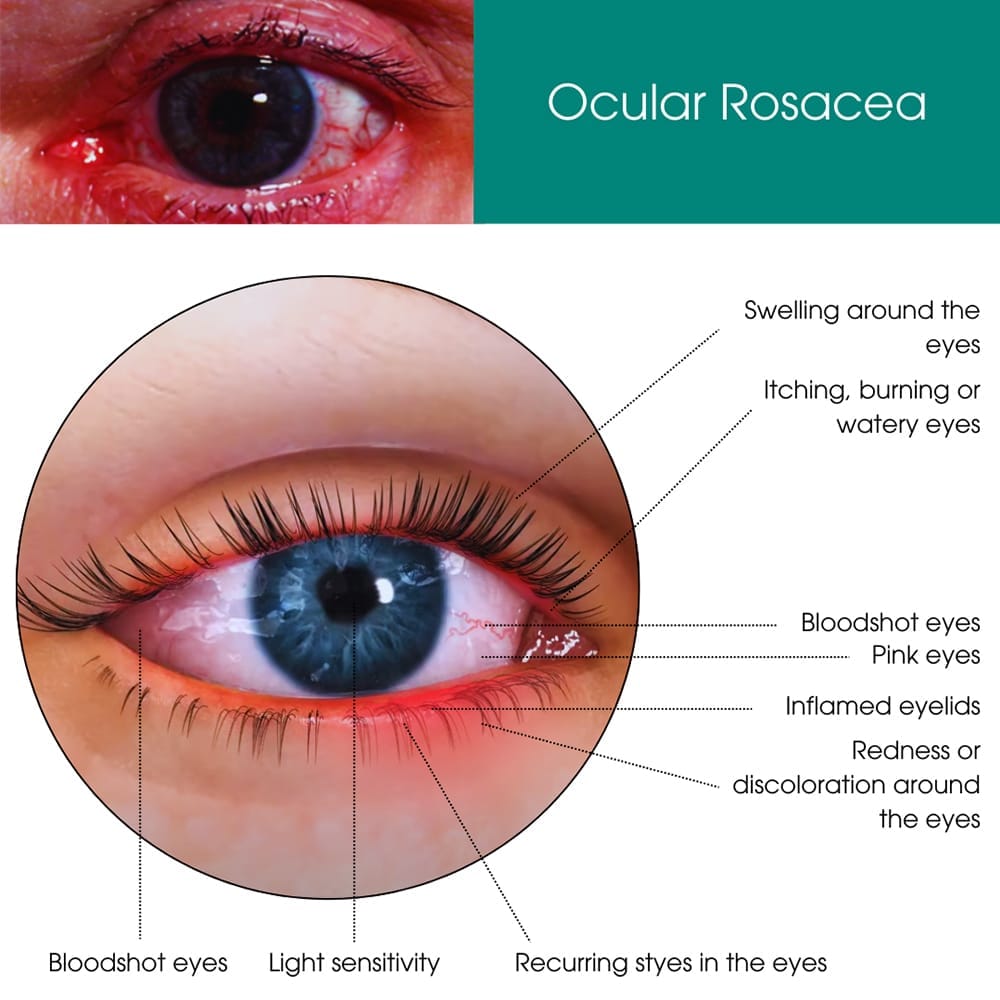 Ocular rosacea is a type of inflammatory disease in your eyes, very similar to meibomian gland dysfunction. It often goes hand-in-hand with the skin disease rosacea, which produces red patches on the face. About five per cent of the earth’s population end up needing ocular rosacea treatments.
Ocular rosacea is a type of inflammatory disease in your eyes, very similar to meibomian gland dysfunction. It often goes hand-in-hand with the skin disease rosacea, which produces red patches on the face. About five per cent of the earth’s population end up needing ocular rosacea treatments.
Typical symptoms include itchy and irritated eyes. Many people with a mild form of ocular rosacea assume it’s just a seasonal allergy. No cure exists for ocular rosacea, but it can be managed with effective rosacea ocular treatment and by avoiding your known triggers.
If the pain and discomfort in your eyes persists over time, consult an eye specialist. In the New York City area, the optometrists at Eye Physicians offer comprehensive eye care that includes the latest treatment for ocular rosacea. Their experienced team gets you in and out of appointments in under an hour.
The symptoms vary from person to person. You may notice that the skin around your eyes is darker than your normal skin tone. In addition, you could feel a constant warm or hot feeling in your eyes.
Other signs that you may need treatment for ocular rosacea may include:
People of color may exhibit many of the same symptoms of ocular rosacea than people with fair or white skin. However, the symptoms may be less visible for people of color. This is because the trademark redness is more difficult to notice on dark skin types. You may even exhibit no tell-tale signs at all.
Whatever your symptoms, they often make it difficult to maintain daily activities like reading or watching your favorite shows. When the ongoing discomfort impacts you in this way, it’s time to make an appointment with your nearest eye doctor. Regardless of which combination of symptoms you experience, only your NYC eye doctor can determine if ocular rosacea treatment is required.
Anyone can develop ocular rosacea, but some people are more at risk for it than others. Some factors you have no control over, while others may be due to lifestyle. Your ocular rosacea specialist makes recommendations if lifestyle changes are warranted.
At risk populations include:
If you fall into two or more of these risk factors, getting regular eye checkups is particularly important. It’s also a good idea to be aware of the symptoms in order to begin ocular rosacea treatments as soon as possible.
Medical experts don’t know exactly what causes ocular rosacea, but they have determined some possible explanations, such as include:
While the cause can’t usually be pinpointed, doctors have determined certain circumstances that trigger the condition, such as:
No tests exist to confirm a diagnosis of ocular rosacea. Your ocular rosacea specialist typically diagnoses the condition based on your medical history and the nature of your symptoms. Keep a journal of the symptoms and what may be triggering them. This is a useful tool in designing the best treatment plan for managing your ocular rosacea.
Rosacea is a chronic disease that can manifest on the skin, in the eye or both. Skin rosacea, generally known as just rosacea, causes your face to turn red. Ocular rosacea is the form that affects your eyes. Often if people develop it in the eye, it’s an indication that it will eventually show up on the skin.
Differences may include:
Your NYC eye care specialist knows how to recognize the signs and design a treatment plan that works for you. If you’re being treated for skin rosacea, ask your provider about getting regular eye exams for ocular rosacea.
The best ocular rosacea treatment is to avoid behaviors or conditions that trigger it. Remember, there is no cure for this eye disease, so the best course of action is to control what brings on the symptoms.
When your ocular rosacea does flare up, your eye doctor may recommend certain treatments known to relieve the discomfort, including:
Your ocular rosacea specialist creates an effective rosacea ocular treatment plan that’s tailored to your symptoms and triggers. Follow it carefully and be patient; it may take one or more weeks before you begin to feel relief. Even if you’re not experiencing a break-out, be sure to maintain use of preventative treatments or medicines prescribed by the doctor.
You should consult an ocular rosacea specialist for treatment if your symptoms worsen or if they persist for long periods of time. Left untreated, complications can permanently affect your vision. In addition, you may be at risk of infection due to the repeated eye rubbing with your hands.
Ocular rosacea can be managed with medication and the proper eye care routine. Your specialist knows specifics such as the best eye drops for ocular rosacea. In the Manhattan area, contact Eye Physicians for expert care and treatment for ocular rosacea. Their professionals bring relief to both you and your precious eyes.
Eye Physicians
110 Lafayette St, Suite 503
New York, NY 10013
(212) 292-4814
Entrust the care of your precious eyesight to highly skilled and experienced eye care professionals. For top-notch ophthalmologists and optometrists in Downtown Manhattan, choose Eye Physicians. Eye Physicians ensures prompt care, precise diagnosis, and personalized treatment plans.
Schedule an Appointment